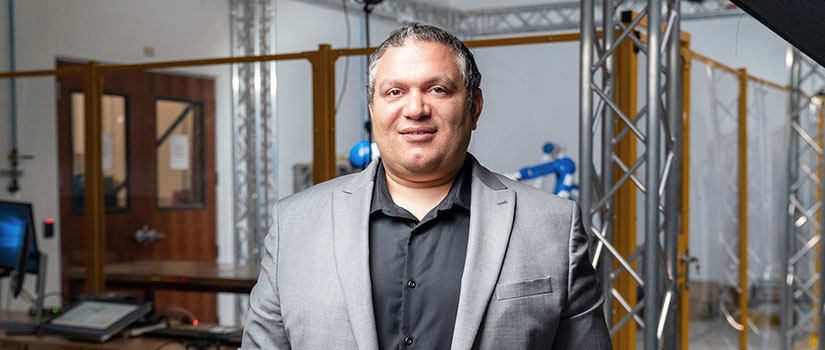Mechanical Engineering Associate Professor Ramy Harik admits he only focused on manufacturing fundamentals and theory when he began teaching in 2007. But soon after, he transformed his teaching to balance fundamentals with their application to industry needs. This fall, in a new graduate course, Harik is creating a balanced learning environment to prepare students for the industrial aspects of developing and manufacturing pharmaceutical drugs.
“This course will educate and provide our students the appropriate engineering knowledge and skills for configuring and using advanced equipment and understanding the intricacies of pharmaceutical manufacturing processes and standards,” Dean Hossein Haj-Hariri says. “In the process, the students will have the unique opportunity to experience first-hand the entire pharmaceutical drug development process.”
The course bridges automation as part of the entire process and evolution; from feeding raw materials into the system, the flow of materials, and creating a final blend for dosage form. This includes fundamentals of sterile manufacturing and tests conducted along the way from different engineering design perspectives. Harik believes the course will help students understand the mindset of operating pharmaceutical manufacturing by maintaining the integrity of the process.
“Developing the best drugs is done by making sure you're maintaining the highest levels of integrity of the process,” Harik says. “It's an ecosystem of things that need to happen, such as using equipment within the facility and how it’s maintained and cleaned. The level of attention you must have to understand the influence of the design on the actual manufacturing process is important.”
Students will utilize state-of-the-art equipment, including an isolated, germ-free clean room donated by Nephron Pharmaceuticals based in West Columbia, South Carolina. The clean room emulates those found in professional settings, and Harik anticipates that students will frequently use the facility to learn operating standards and management. Pharmaceutical manufacturing standards require filling processes be performed in clean room environments. Students will also design equipment to use in a clean room.
“Usually in mechanical engineering we want to meet requirements such as strength and stress. You want to make sure it does not break. But with this [pharmaceutical manufacturing], you want to make sure it is not generating issues that will influence something else that could break the clean room environment,” Harik says.
Several other topics will be taught, including understanding the operational environment, how process steps connect to the design and how to provide supporting evidence of the manufacturing design for validation. The topics will be examined from perspectives of the design of the equipment and the operation of the manufacturing process.
“Installation and operational qualifications and understanding the performance in actual production are some of the important things one needs to understand,” Harik says. “It's important to answer questions such as ‘What if you lose power on your machine?’ Or ‘How does the machine maintain the integrity of the process and for how long?’”
Each interconnected topic is intended to lead to adoption. Students will learn how to manufacture a drug to be sold in the U.S. or internationally by understanding the different standards and regulations.
“All elements will be interconnected to deliver a knowledge that is more of a constraint to raise the bar,” Harik says. “Students take robotics, automation and other practical courses, but not in an interconnected manner for pharmaceutical manufacturing. This course brings everything together.”
Harik holds a joint position as chief manufacturing officer at Nephron Pharmaceuticals, allowing the company to collaborate with the University of South Carolina Colleges of Pharmacy and Engineering and Computing to bring the course to life.
“It was very important to start a collaboration with Nephron and the university. Teaching this class will make it easier to leverage some of the hands-on experience and bring it straight to the classroom, creating an educational experience inspired by the day-to-day requirements at Nephron,” Harik says.
Nephron Pharmaceuticals CEO and UofSC alumna Lou Kennedy is also enthusiastic about the partnership.
“We never pass up an opportunity to partner with the brilliant students and researchers at the University of South Carolina,” she says. “Working together with the brightest leaders of the future from colleges and universities across the state, we are making progress – whether it is smart manufacturing or developing lifesaving medications – and that means better health outcomes for patients around the country.”
